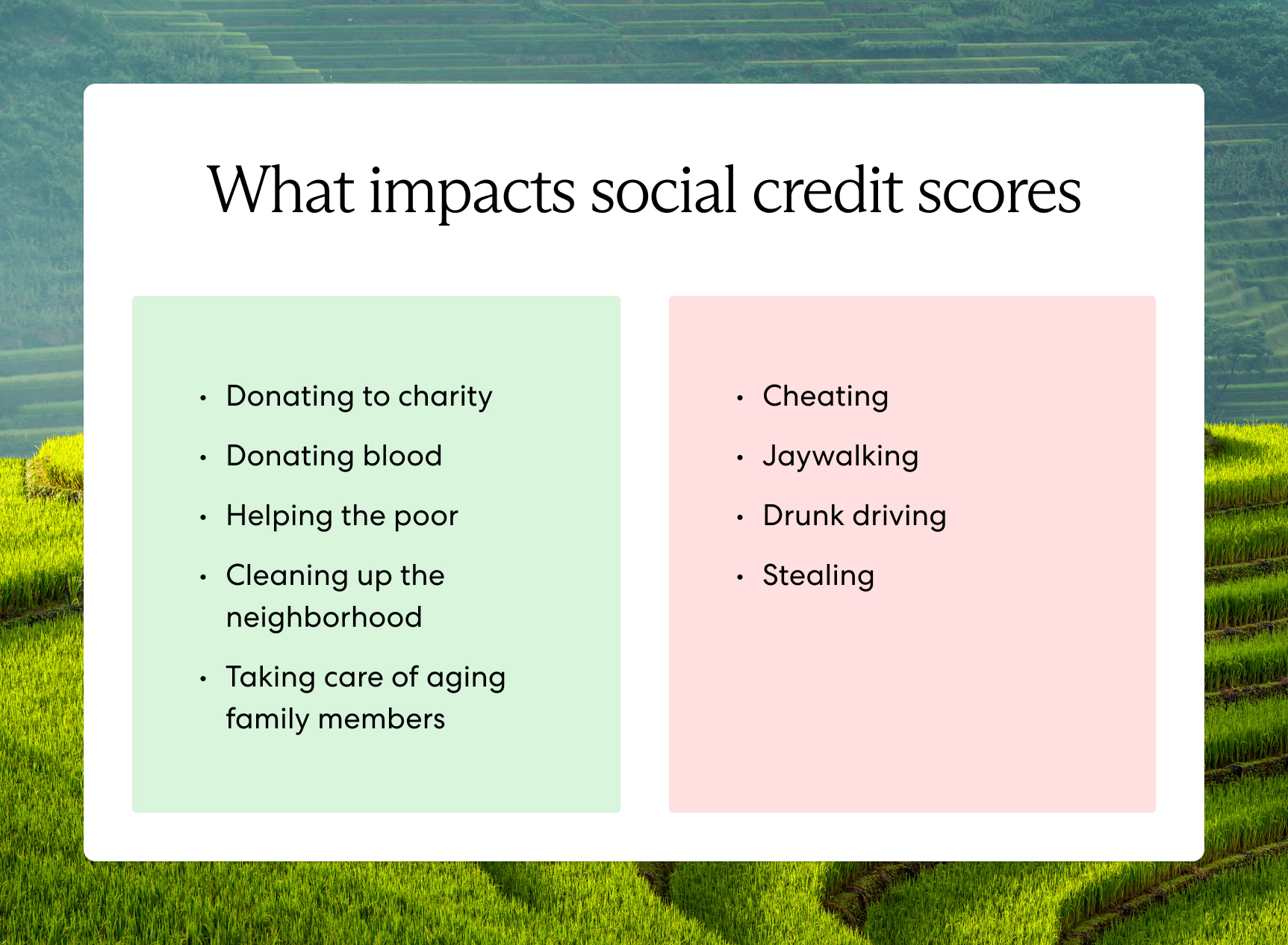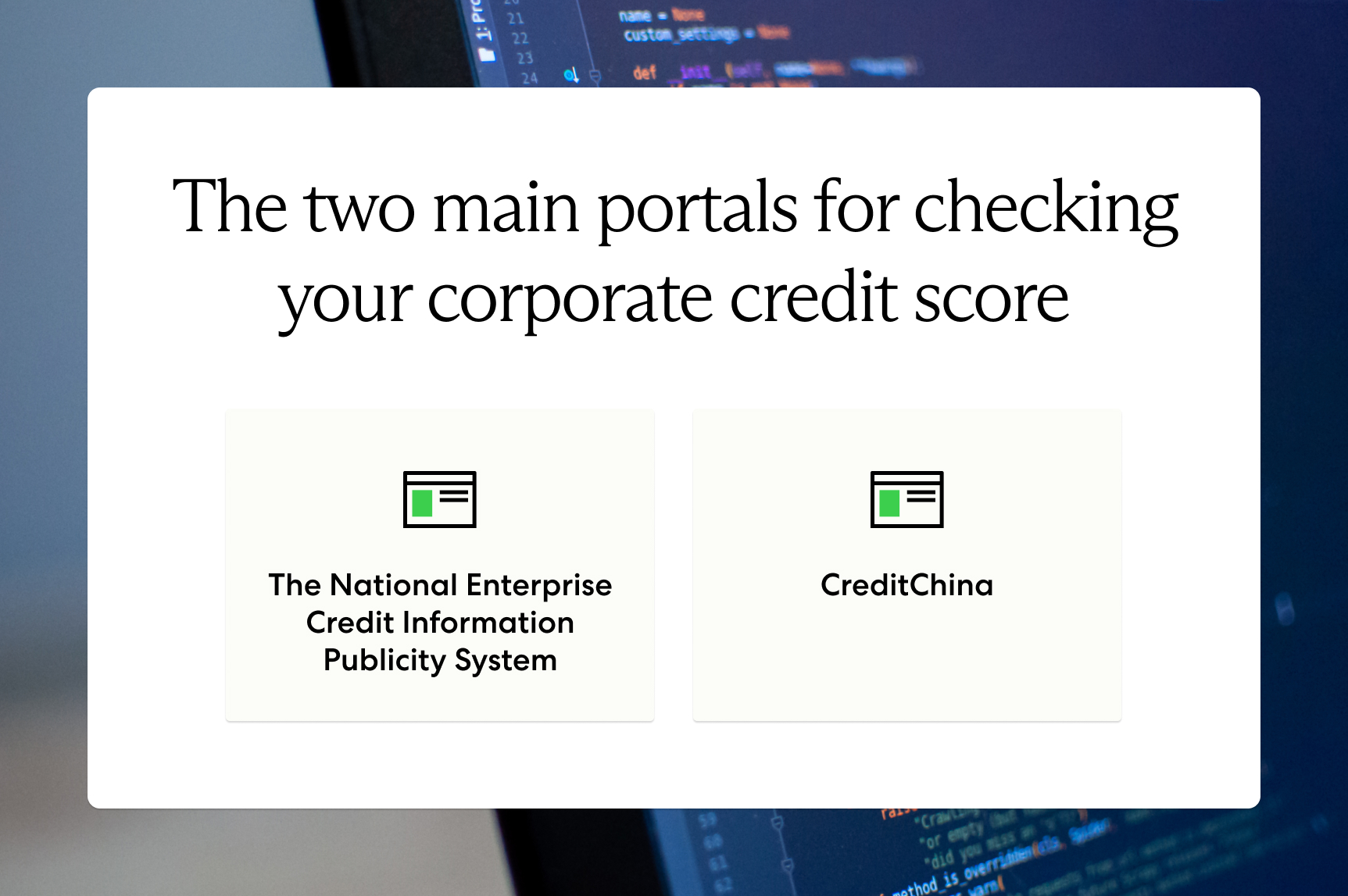China is a great choice for any organization looking to expand its business abroad. The country’s rapidly growing economy and large number of opportunities make it so that many different businesses can thrive there.
Before entering the market, businesses should learn the ins and outs of China’s social credit system. The social credit system was designed to make sure individuals and businesses in China comply with the country’s laws and regulations.
To help businesses learn more about this system, we’ve put together a guide to China’s social credit system and what it means for businesses.
Key Takeaways:
- China’s social credit system gives individuals, businesses, and government entities a credit score based on their trustworthiness.
- A bad credit score comes with penalties like reduced access to credit and fewer business opportunities.
- Corporations seeking to fix a bad credit score must submit an application to do so.
China’s Social Credit System Explained
The People’s Republic of China created the social credit system—which is sometimes referred to as SCS, SoCS, or China’s ranking system—to function as a unified record system that measures businesses, individuals, and government entities to evaluate their trustworthiness.
The goal of the Chinese social credit system is to regulate social behavior and ensure that those being documented remain “trustworthy” through actions like paying bills on time, abiding by the law, and reporting financial data accurately.
Social Credit System vs. Corporate Social Credit System
China’s social credit system rates individuals, entities, and corporations in China, while its corporate social credit system applies only to businesses.
The social credit system is based on many data points, from financial creditworthiness to social factors such as honesty, hard work, and devotion to family. China has national and regional blacklists that are based on individual violations, and a poor score impacts a person’s ability to travel, gain employment, or access credit.
On the other hand, the corporate social credit system rating is based on factors related to companies doing business or hiring employees in China, including but not limited to the following:
- Paying taxes on time
- Maintaining proper licenses
- Fulfilling environmental protection mandates
- Meeting requirements applicable to their industry
- Behavior of a business’s partners
As part of the corporate social credit system, businesses that are not compliant are placed on the “irregularity” list. The irregularity list is the step before being blacklisted, so businesses still have an opportunity to improve their score and reputation.
What Is the Purpose of the Chinese Social Credit System?
China’s social credit system aims to make sure the people and businesses living or operating in China are compliant with the rules and regulations that are in place there. By imposing rewards for compliance and penalties for noncompliance, the system aims to stretch beyond suggested codes of conduct and enforce rules with consequences.
Blacklists vs. Redlists in China’s Social Credit System
Blacklists are based on various violations—typically either because an individual or business has a particular violation or because of a low social credit score. Businesses do not automatically end up on the list for compliance failures, but they face being blacklisted if they do not address those failures swiftly.
The blacklisting system is complex. State agencies and local authorities manage blacklists, and there are hundreds throughout the country. Once on a blacklist, it’s hard to be removed. In fact, it can take up to two to five years to be removed from a blacklist.
Redlists are the opposite of blacklists: people and businesses with high social credit end up on redlists. Redlists are compiled of the country’s most outstanding members of society; these individuals and businesses enjoy rewards such as access to capital and fast-tracked approvals.
How Does the Social Credit System Work?

The People’s Bank of China and the Chinese government compile data about individuals and businesses through various mediums, including financial and government records and online credit platforms.
Once collected, this data is then analyzed, and each individual, business, and government entity receives a social credit score.
Those with a good social credit score are considered trustworthy and receive perks such as waived rent deposits, tax breaks, work promotions, or cheaper fares for public transportation.
Those with a bad social credit score receive penalties in the form of things like loan denials, restricted travel, or even public shaming.
For citizens, “good” actions could include donating blood or donating to charity, while “bad” actions could be things like driving while intoxicated.
For businesses, “good” actions could include timely payments, donating to charity, or getting good reviews from customers and business partners; bad actions could include missed payments, employee disputes, or noncompliance with local employment laws.
Brief History of China’s Social Credit System
The current social credit system was put in place in 2014, but its roots go back to the era of Confucius in 551-479 BCE.
Confucianism ideology emphasizes the individual’s contribution to making society function well, placing importance on good character. Another philosophy, Mohism, puts importance on caring for one another, while Legalism emphasizes following laws to uphold social order.
These three schools of thought influenced the Qin dynasty of 221–206 B.C. during which the Chinese state implemented a meritocratic assessment system, though it was rudimentary.
Public record systems to monitor individuals’ behaviors eventually emerged in the 20th century with the “hukou” in 1958, which registered households and monitored domestic movement in China.
The current social credit system went through early iterations in the mid-90s when the People’s Bank of China started sharing financial credit information with commercial banks.
The credit system was predominately economic until 2004 when President Jian Zemin introduced the social credit system. Regional pilots of the program started in 2009, and the blacklist was established in 2013.
The Chinese government adopted the social credit system in its current form in 2014.
Social Credit System Pros and Cons
The social credit system has been scrutinized worldwide, with critics saying the system resembles a science fiction novel. However, others praise the system as a way to maintain fairness and social order.
Pros of the Social Credit System
- Holds citizens and companies accountable
- Could increase safety in China
- Motivates people and businesses to uphold the law
Cons of the Social Credit System
- Some may consider associated video monitoring and surveillance an invasive practice
- Algorithm miscalculations or scoring mistakes could see people or businesses unfairly penalized
Are Foreign Individuals Impacted by the Social Credit System?
As far as ranking individuals, China’s social credit system is only concerned with Chinese citizens. That means that those visiting the country don’t need to worry about their social credit score while they’re visiting. Individuals should only pay attention to China’s social credit system if they relocate from another country on a visa with the intent to work.
However, for corporations, just doing business in China gets you a social credit score. Businesses that operate in China receive a corporate social credit score based on factors like tax payments, debt payments, employment law compliance, customer reviews, and reviews from business partners.
How Does the Social Credit System Impact Businesses?
Businesses that operate under the social credit system—including permanent establishments—are held to a high standard. Companies that are late on or miss tax or loan payments, have employment disputes, don’t meet product quality standards, or don’t have proper licensing could expect a poor social credit score.
Businesses are also responsible for who they conduct business with. For example, a company in good standing could still face penalization if it conducts business with another organization that has also faced penalization.
Punishments in China’s Social Credit System
Businesses and individuals with a bad social credit score face several potential punishments.
Because of the public nature of the blacklist system, people and organizations with low credit could face restrictions from certain luxuries like travel and lodging. However, the challenges of low social credit also extend to basic needs, like school and employment.
Below are a few examples of penalties entities could face with a low social credit score.
- Travel bans. People with low social credit ratings often face restrictions from traveling by plane or train in China. The travel ban also extends to traveling overseas to stop people with bad social credit from leaving the country.
- School bans. Those with a low social credit score may face school bans for their children. Schools and universities deny students whose parents have violations on their social credit score such as high debt.
- Hotel bans. Similar to the travel ban, certain hotels ban individuals with low social credit scores. Hotel bans hinder people’s ability to travel for work or tourism and limit freedom to move throughout the country.
- Internet throttling. People with low credit scores may also face slower internet speeds as a penalty. Internet throttling impacts an individual’s ability to apply for jobs, communicate with others, and access information online.
- Career obstacles. Individuals with low social credit scores may face career challenges in China. Companies consult blacklists before hiring, and some positions in government are restricted to those who meet a social credit threshold.
- Public shame. Given the public nature of the social credit system and blacklist, people with poor credit often face public shaming. Regulators have encouraged “naming and shaming” practices, harming individuals’ social standing and preventing businesses from growing.
The punishments for low social credit are severe in China. However, on the other end of the spectrum, high social credit is a major boon to individuals and businesses.
Rewards in China’s Social Credit System
There are many benefits of a high social credit score. Beyond financial incentives, people and businesses with good credit could save time and resources in several ways.
- Good interest rates at banks. Banks often reward individuals and businesses with high social credit by offering better interest rates. With more favorable loan terms, those with good credit have better access to buying homes and starting businesses.
- Fewer inspections and audits. The government often favors people and businesses with high social credit. Good credit means fewer inspections and audits and less scrutiny overall.
- Simplified administrative procedures. Companies that are classified as “Advanced Certificate Enterprise” are often fast-tracked for customs clearance. People with an “A-rating” may also have their tax returns processed more quickly than people with low credit.
People and businesses strive for high social credit for significant reasons: access to low-interest loans, less scrutiny, and fast-tracked approvals make it far easier to thrive and do business in China.
What To Know if You’re Expanding into China
Businesses expanding or hiring employees in China must be prepared to meet the country’s compliance regulations before hiring or operating locally. Those who do not may face penalties for any infractions.
Expanding into China means adhering to the laws that govern the social credit system. Businesses that are not compliant could face greater challenges than fines, such as travel bans, inability to obtain credit, and significant reputational damage.
So before you expand, make sure your business is familiar with China's labor and employment laws, tax laws, and other legal requirements. A compliance partner, like an employer of record (EOR) can help you navigate these legal requirements and keep your social credit score high.
Find more information in our complete guide to China's labor laws.
How To Check Your Corporate Social Credit Score

Companies can check their corporate credit scores using the National Enterprise Credit Information Publicity System (NECIPS) or CreditChina.
Using CreditChina to Check Your Score:
CreditChina is a more user-friendly database where you can see your business’s basic information and any administrative penalties, tax errors, unpaid wages, or payment defaults you are at fault for.
- Step 1: Navigate to the CreditChina homepage.
- Step 2: Navigate to the “Credit” tab (the first one).
- Step 3: Input your business name or code.
Using the NECIPS to Check Your Score:
The NECIPS provides a more comprehensive overview of your company’s score but is less user-friendly than CreditChina.
- Step 1: Navigate to the NECIPS homepage.
- Step 2: Input your business name or code.
How To Fix Your Social Credit Score
You may need the following documents to fix your corporate social credit score:
| GENERAL BREACH OF TRUST | SERIOUS BREACH OF TRUST | |
|---|---|---|
| Rectified via the credit department | Rectified via the source administering department | Rectified via the credit department |
|
|
|
Fixing your credit score isn’t as easy as rectifying the problem and seeing your score rise—which is why it’s best to have a compliance partner on your side. Some more serious infractions like threats to public safety or serious crimes cannot be erased from your record.
However, other penalties can be erased. Once you’ve rectified the problem through actions like cutting off a supplier that is in bad standing or making up for any lost payments, you can apply to have your credit score fixed. Less serious infractions are easier to fix, while more serious ones require a lengthier process.
Ensure Compliance When Expanding to China
When doing business in China or hiring local talent in the country, you likely won’t purposefully face penalization for any wrongdoing—but you might violate regulations without realizing it.
Avoid the headaches and legal penalties by partnering with an employer of record (EOR) like Velocity Global. Velicty Global not only simplifies your expansion and global employment efforts but ensures your business stays in good standing.
Velocity Global is well-versed in international employment and tax laws and helps businesses expand or hire in China—and more than 185 countries—while mitigating risk. We also provide legal counsel, draft compliant employment contracts, and take care of talent onboarding, payroll, benefits administration, and HR support.
Contact us to learn how we can help you quickly and compliantly build your team in China.
Legal Disclaimer: The information available in this guide does not, and is not intended to, constitute legal advice and is for general informational purposes only. You should contact your attorney to obtain legal advice with respect to any particular legal matter. Only your individual attorney can provide assurances that the information contained in this guide—and your interpretation of it—is applicable or appropriate to your particular situation. All liability with respect to actions taken or not taken based on the information in this guide is hereby expressly disclaimed. The content in this guide is provided "as is," and no representations are made that the content is error-free.
Topic:
Compliance



